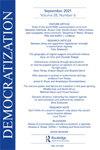The contestation of international ties and regime transitions: evidence from the former Soviet republics
IF 2.9
1区 社会学
Q1 POLITICAL SCIENCE
引用次数: 0
Abstract
Studies of noncooperative transitions find that domestic balances of power shaped postcommunist regime trajectories in favor of the powerful. Then, what determined the balance of power during a transition? Drawing on relational-network analysis in IR, I argue that the configuration of international ties determined the relative strength of democrats and Soviet-era elites. States with diversified ties between the US and the Soviet Union - that occupy a brokerage position- were more likely to democratize. Their ties with the US funneled material and non-material assistance into democrats in postcommunist states. However, states deeply integrated into the Soviet order resisted democratization to a greater extent. Their extensive ties to the Soviet order resulted in stronger Sovietization and Soviet legacies impeding democratization. The interplay of states' ties with the US and the Soviet Union, as a function of brokerage and integration, shaped the domestic balance of power, conditioning postcommunist political changes. Empirical analysis using medium-N analysis and case studies on the former Soviet Union republics lends support to the argument. The finding contributes to the literature on international determinants of regime changes by highlighting how underlying global power structures frame the domestic balance of power.国际关系与政权变迁之争:来自前苏联加盟共和国的证据
对非合作转型的研究发现,国内权力平衡塑造了有利于强者的后共产主义政权轨迹。那么,是什么决定了过渡时期的权力平衡呢?根据国际关系中的关系网络分析,我认为国际关系的结构决定了民主人士和苏联时代精英的相对实力。在美国和苏联之间拥有多样化关系的国家——占据中介地位——更有可能实现民主化。它们与美国的关系为后共产主义国家的民主人士提供了物质和非物质援助。然而,深深融入苏联秩序的国家在更大程度上抵制民主化。它们与苏联秩序的广泛联系导致了更强的苏维埃化和阻碍民主化的苏联遗产。各国与美国和苏联关系的相互作用,作为中介和一体化的功能,塑造了国内的权力平衡,制约了后共产主义时代的政治变革。利用中- n分析和对前苏联共和国的案例研究进行的实证分析支持了这一论点。这一发现通过强调潜在的全球权力结构如何构建国内权力平衡,为有关政权更迭的国际决定因素的文献做出了贡献。
本文章由计算机程序翻译,如有差异,请以英文原文为准。
求助全文
约1分钟内获得全文
求助全文
来源期刊

Democratization
POLITICAL SCIENCE-
CiteScore
6.40
自引率
12.50%
发文量
73
期刊介绍:
Democratization aims to promote a better understanding of democratization - defined as the way democratic norms, institutions and practices evolve and are disseminated both within and across national and cultural boundaries. While the focus is on democratization viewed as a process, the journal also builds on the enduring interest in democracy itself and its analysis. The emphasis is contemporary and the approach comparative, with the publication of scholarly contributions about those areas where democratization is currently attracting considerable attention world-wide.
 求助内容:
求助内容: 应助结果提醒方式:
应助结果提醒方式:


